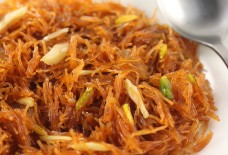America's Other Orchestras: Arab American Ensemble Series Episode 7
Baladi Festival On the Golden Coast
BY: Sami Asmar/Contributing Writer
The romantic city of Santa Barbara on the beautiful California coast is a mecca for tourism as well as the home of one of the campuses of the University of California. Just like its older sister UCLA, UC Santa Barbara has a music department with performance ensembles of world music with the Middle East Ensemble being one of the bigger and active ones. It is no coincidence that UCSB has such an ensemble. Its 1989 founder, Professor Scott Marcus graduated from UCLA under Professor AJ Racy and carried the tradition to his job on the faculty of another UC campus.
Professor Scott MarcusWhile other ensembles specialize in one geographical style, such as Arab music, the UCSB ensemble is much more diverse. Just like the city of Santa Barbara, the ensemble is very distinctive. Its concerts cover music and dance from Arab, Turkish, Persian, Armenian, Greek, Sephardic, Kurdish, and Assyrian cultures.This diversity attracts a large following from campus and community members who relate to these cultures. To accommodate such styles, the ensemble is very large, possibly the largest outside the Arab World – often exceeding 50 members on stage, not counting dancers; the percussion section alone can have more than 20 artists and the chorus a dozen.
Typical repertoire is also very varied and includes classical, religious, folk, popular, and cabaret-style dance pieces. The dances are integrated in their rehearsal and performances. The beautiful movement and color add to the musical interpretation and the combined visual and audible effects turn every concert into an exciting cultural festival.
Ensemble director Scott Marcus completed a doctoral dissertation in Arab Music Theory in the Modern Period and spent time studying in Cairo with faculty members at al-Ma`had al-`Ali li-l-Musiqa al-`Arabiyyah (The Higher Institute for Arab Music) and Kulliyat al-Tarbiyyah al-Musiqiyyah (The College of Music Education). With these connections, he recently took 54 musicians, singers, and dancers on a tour of Egypt sponsored by the Ministry of Culture and performed at the prestigious Opera House among other venues.
Scott is assisted by dance instructor Cris! Basimah who trained in classic and modern ballet, Latin dance styles, Egyptian, Turkish, American Cabaret and Folkloric dance from numerous oriental regions. Sue Rudnicki has led the sizeable percussion section since 1989. She was a student of master Arab drummer Souhail Kaspar and also studied Persian, Armenian, and Uzbek drumming and often lecture in the Music Department.
The UCSB story is another chapter in how Arab music has spread in the American culture. Academically initiated by AJ Racy, it is now practically standard curriculum in many major universities. Some of Scott Marcus’s own students have themselves graduated and became faculty who propagate this musical culture to the next generation.
Trying to stay true to some cultural aspects of the time he spent with performing musicians in Cairo, Scott maintains a fast-pace and exciting performance style dressed in tuxedos while the women, especially the dancers feature colorful traditional outfits. The so-called cabaret-style dancing was a big hit for weekend entertainment in Los Angeles and New York in the 1970s and 1980s where many nightclubs retained high quality musicians and dancers and paid them well. They still refer to that era as the good old days.
To see this in Cairo or Beirut is normal, and to talk about events in downtown Los Angeles is believable, but to see this great heritage continue in small town America is fantastic. Sleepy Santa Barbara, not only a daytime soap opera, actually stays up late to the Baladi beat of this highly popular ensemble. In the process, if a little bit of cultural education is spread out to the extended the community, the world is a better place.
UCSB Amplified: The Middle East Ensemble guest vocalist Isabel Bayrakdarian from UC Santa Barbara on Vimeo.



